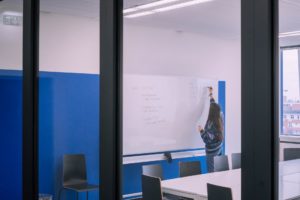We are a team of over 90, all in one large office without cubicles or walls splitting people into different groups. How does that work? The answer is quite simple: nobody speaks. Our “Mainland” is a silent office and many say the only functioning open-plan office in the world. It’s a long-term project with the aim to create a space for result-oriented work without distraction — deep work — and to maintain it despite rapid growth.
The Origins
Kolibri’s first office was the shared flat of our founders. In the small living room, only one person speaking could disrupt the work of all others. So, quite naturally, the team decided to stay silent in the main working area and speak elsewhere, in the kitchen, on the balcony or the bedroom (aka the “meeting rooms”).
Our culture is designed for leanness and achieving fast results; our work is characterized by phases of intensive planning and communication on the one hand and the concentrated completion of tasks on the other. To best suit this work method, our founders created a setting with two spaces that complement every role and every need for communication: our silent Mainland takes up only 30% of our office space, the remaining 70% are reserved for our lobby and many meeting rooms in different sizes for communication and collaboration.
The Kolibri Games lobby
A UC Irvine study estimates that it can take up to 23 minutes to refocus on a task after an interruption and that the average worker switches tasks every three minutes. Where many startups, especially in the gaming industry, deliberately mix work and play (having a ping-pong break in one corner, while developers are still coding in the other), we have been strictly separating deep work from communicative work from day one.
Use advantages, eliminate disadvantages
Putting it bluntly, our Mainland is about making use of the advantages of an open-plan office, while at the same time eliminating its disadvantages. It really is the best of both worlds: it creates team spirit and communicates the constant accessibility of the leadership team. At the same time, it gives each team member autonomy over their time and space — they can choose where they want to work, and therefore influence when they are available.
Naturally, for people who have only ever worked in other settings before, this way of working takes some time getting used to and means a real change of habits. An interesting side effect is that working in silence leads people to question their own communicative behavior and, eventually, rarely disturb others during their work.
Instead of quickly heading over to your colleague’s desk and asking them a question, you need to write them a message. This way of communicating is much more reflexive: People often don’t think before asking someone a question that might disturb their workflow. Here, you think twice: “Is this really worth disturbing the other person for, or can I find this out myself?”.
Meeting rooms at Kolibri Games — in all sizes, for every purpose.
Making restrictions least restrictive
When I give people a (silent) tour through or Mainland, many get the impression that we work in a restrictive office setting. On the contrary, our silent office is in many ways less restrictive than a traditional open-plan office — after all, constant background noise is simply another form of restriction. In addition, our cozy lobby and the many meeting rooms offer even the most communicative person the right work environment. With a team of over 90, restrictions are almost necessary. It’s all about providing individual freedom and how these restrictions can be circumvented or personalized to be least restrictive.
A concept like ours doesn’t even come to mind for many, simply because it’s so counterintuitive — having 90 plus people in the same room, all working in silence. Regular open-plan offices are popular because companies value communication and collaboration, so working in silence is going to restrict communication and freedom of expression, right? On the contrary, it makes communication much more reflexive and purposeful. Our silent office does not create a tense work environment in which nobody is allowed to cough or sneeze — but it promotes consideration and respect for the work of others.
Yet, all of this is not to say that our Mainland as a way of working is a universal way to success and can serve as a successful blueprint for any place. It needs to suit the type of work you are doing and needs people who are willing to commit to this change — at Kolibri Games, we were lucky enough to have founders who did just that.
Contemplate, communicate, iterate
You are intrigued? Great! Here are some suggestions on how you can try this out for yourself:
Start out by analyzing if any form of silent office would suit your workplace: Look at the individual job positions across your team and see what their interaction and communication looks like. Would it be possible to centralize or relocate some of that? Also, check if your current infrastructure allows the implementation of a silent office, or could be repurposed to suit your needs. If all that works out, talk to everyone and communicate the idea well — do people even want this? If it’s a yes, you could use an iterative approach and start by trying it out for just half a day and see how that works.
Out of the comfort zone, into the quiet
A silent office like ours means a step out of the comfort zone for any company. What initially sounds like working in a library, actually creates a personally and professionally promoting corporate culture for many. Through a simple rule — no talking — it reflects and deeply anchors our work ethics and values in our day-to-day activities.
Although implementing and maintaining such a setting is quite the challenge, especially in times of rapid growth, it has paid off for us and has become a vital part of how we think and work at Kolibri Games.



